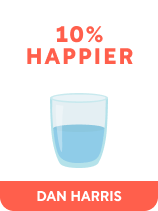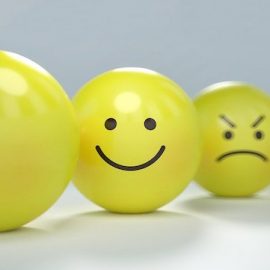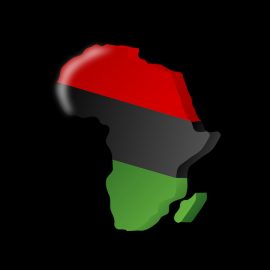

This article is an excerpt from the Shortform book guide to "10% Happier" by Dan Harris. Shortform has the world's best summaries and analyses of books you should be reading.
Like this article? Sign up for a free trial here .
What lessons did Dan Harris learn from Eckhart Tolle? What four truths about ego does Harris share?
In his book 10% Happier, Dan Harris explains how he was once lost in life—he suffered from career anxiety, panic attacks, and drug addiction. At the time, he was a self-help skeptic yet he agreed to read Eckhart Tolle. Dan Harris said that after learning about Tolle’s take on ego, his way of thinking changed forever.
Continue reading to learn what lessons Harris learned from Tolle.
Dan Harris and Ego
After battling with career anxiety, trauma from journalism, drug use, and on-air panic attacks, Harris continued to go to therapy and eventually found himself in a more stable position in his career. However, while he felt he had managed to get his troubles somewhat under control, he didn’t yet feel truly secure at work or comfortable in his mentality. Harris explains that it was at this time that he came across philosophies outlining people’s relationship with their own egos, a line of thinking that helped him recognize what was holding him back from psychological healing.
At his coworker’s recommendation, Dan Harris bought Eckhart Tolle’s A New Earth: Awakening to Your Life’s Purpose. Tolle’s thoughts on what our ego is and how it affects our behavior had a big impact on Harris’s thinking, helping him to see how he could move beyond the various problems he had accumulated.
Tolle defines our ego as our internal voice or narrator. Tolle’s definition of ego differs from many people’s typical understanding of ego, as he doesn’t define it as pride or arrogance. Nor does he define it in the way that Freudian psychiatrists do, as the part of our psyche that regulates our emotions. Instead, Tolle defines ego as our use of “I”: It’s how we talk to ourselves about ourselves, others, and the world around us.
Tolle notes that, often, this inner voice is negative, causing us to be judgmental and insensitive. Unless we are mindful and aware of our egos, our thoughts and actions are driven by this negative internal voice, which is the source of much of our unhappiness and stress in our lives.
(Shortform note: In The Inner Game of Tennis, Timothy Gallwey expands on an idea similar to Tolle’s definition of ego. Gallwey writes that when people talk to themselves, there is a disconnect between the “I” talking and the “self” listening. He distinguishes between two selves: Self 1 and Self 2. Self 1 is our ego-driven mind that chastises or praises Self 2, which is our physical self that acts intuitively. We succeed when we can quiet Self 1 and allow Self 2 to act.)
Harris suspected many of his problems stemmed from his ego, as Tolle defines it. He discusses four truths about egos that cause problems for people.
Truth #1: Egos Can’t Be Satisfied
Our egos are never satisfied. Harris asserts that nothing we do is enough to please our inner voice. This is the feeling of “If I just get this promotion, I’ll be happy” or “If I just lose 15 pounds, I’ll feel good about myself.” Even if you get that promotion or lose 15 pounds, your inner voice won’t be satisfied or happy, and you’ll find something else that you “need” to be happy.
Harris explains that his ego pushed him to work hard in his career, causing him to put other parts of his life on hold, like building relationships and taking time to unwind at home. He constantly tried to satisfy his ego with accomplishments at work and even his drug use. Harris claims that whenever he did these things, his ego would inevitably want more.
(Shortform note: Our egos can also be self-limiting, which perpetuates our feelings of never being satisfied. In Can’t Hurt Me, David Goggins calls this internal voice or regulator a “governor.” He believes our governor gives us feedback about the world and what we’re feeling, often holding us back from reaching our full potential. When we tell ourselves, “This is too hard” or “I’m too tired,” that’s your governor holding you back. Goggins asserts that once you learn to master your governor, you’ll stop limiting yourself.)
Truth #2: Egos Compare Ourselves to Others
Harris explains that our egos compare ourselves to others, causing us to constantly look at other people’s successes and failures and see how we measure up. For example, when you look at someone’s pictures on Instagram and feel bad that your life doesn’t look as good or fun as theirs, this is your ego comparing yourself to them.
Harris describes how he was caught up in this mentality, critical of others and constantly evaluating his and his colleagues’ work performance. He would then mentally stack up how they compared and if he was “winning” (getting more air time, producing a high number of stories, getting more praise from bosses, and so on). Harris believed that this kind of mental tallying helped his career and gave him his edge.
(Shortform note: In Daring Greatly, Brené Brown discusses another reason we are drawn to compare ourselves to others: scarcity culture, or our societal belief that we never have enough. Our scarcity culture exacerbates our tendency to compare ourselves with one another, seeing how we “measure up” in value. This causes us to feel like we are never enough, leading to unhappiness.)
Truth #3: Egos Feed on Drama
Harris notes that egos can make us fixate on drama and conflict, which can make it difficult for us to separate our minds from our troubles. When we get into a fight with a friend or are snubbed for a promotion at work, we usually have trouble letting go of it. When a stranger gives us a funny look, we create a narrative for it. We ruminate in the drama, worrying about what we did wrong or blaming the other person. Harris argues that this is because our inner monologue (our ego) constantly revisits these experiences.
Harris describes bringing workplace drama home with him, and he found it hard to let issues go. For example, despite people telling him otherwise, he says he convinced himself that he was losing his hair, which he thought would result in the end of his career.
(Shortform note: In Little Red Book of Selling, Jeffrey Gitomer discusses specific ways in which fixating on drama at work can disrupt your career. By dwelling on drama, you waste your own time, energy, and potential for success. He also believes that you’re more likely to develop a bad attitude, give bad advice, and make people angry by taking sides or perpetuating the drama.)
Truth #4: Egos Obsess Over the Past and Future
Harris says that our egos obsess over the past and future, making it difficult to appreciate the present and how we feel in each moment. We focus on what has happened to us in the past, like making an awkward comment at a party last month. Or we focus on what could happen in our future, such as what to wear and say on a date next week. This distracts us from the present—what is currently happening around us.
Harris describes experiencing this with his career anxiety because he always focused on the outcome of his work, not the process. He would envision the finished news story or the promotion without enjoying the process of getting there.
| Insights From Ego Is the Enemy In Ego Is the Enemy, Ryan Holiday discusses additional ways that our egos can prevent us from finding success. Unlike Tolle’s idea of ego, Holiday’s definition includes both our inner voice and the traditional idea of ego as arrogance or pride. Holiday contends that our ego can actually get in the way before, during, and after our success. He believes this is due to the ego’s interference with how we think, act, and react. Thoughts: Holiday contends that our egos lie to us through our thoughts, creating a false sense of what we’ve accomplished. Having an inflated self-esteem without anything to back it up can hinder us from actually achieving something great. To conquer your egotistical thoughts, Holiday advises that you should stop being prideful, stop thinking about yourself, and stop talking about yourself. These habits drain your energy and waste your time. Actions: Our ego can prevent us from doing the right things, leading us to choose recognition over accomplishment. Recognition will get you external approval, while accomplishment will satisfy your own sense of success. Holiday recommends being logical and purposeful when pursuing your passion and committing to constantly learning. Reactions: According to Holiday, our ego distorts how we see ourselves and other people, causing a sense of superiority (in a similar way to how Harris says ego compels us to compare ourselves to others). This can interfere with our interactions with people, preventing us from developing meaningful relationships that can help us in our personal and professional lives. To counter this tendency, Holiday advises that you find a mentor, a mentee, and a collaborator or competitor to help you commit to being a lifelong student. These people will aid you in different ways as you learn, which can help keep your ego in check. |

———End of Preview———
Like what you just read? Read the rest of the world's best book summary and analysis of Dan Harris's "10% Happier" at Shortform .
Here's what you'll find in our full 10% Happier summary :
- A skeptic’s journey through the world of self-help
- How to control your anxiety, manage your ego, and become more compassionate
- How you can improve your life and career—even by just 10%






